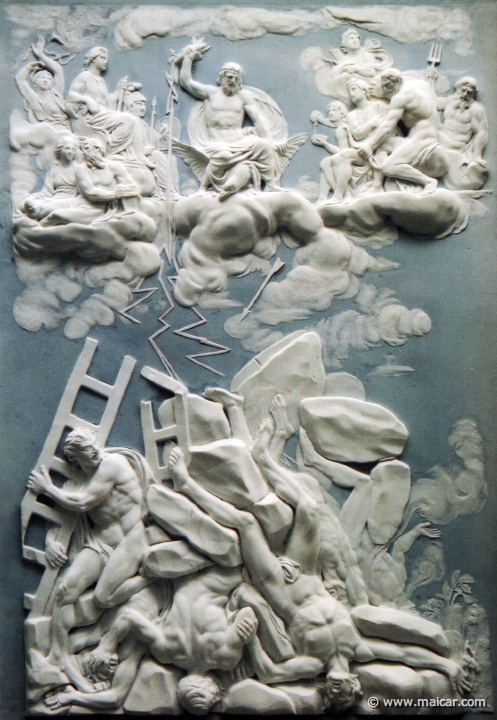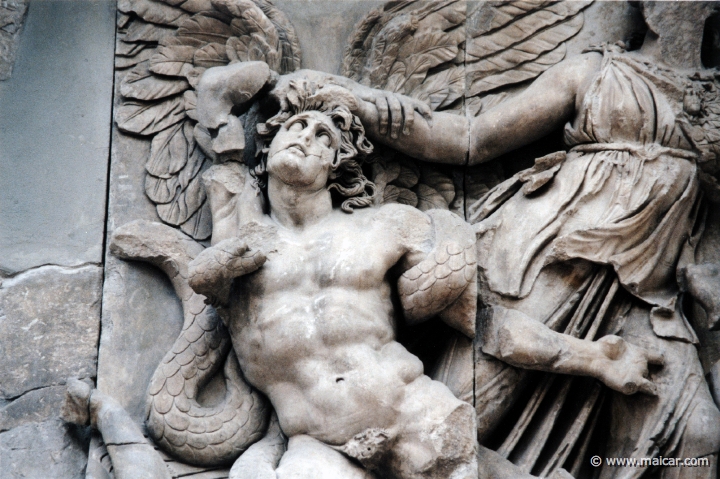|

|
Scene of the Gigantomachy. 9913: Júpiter y los gigantes. Cerámica.Fines del s. XVIII. Museo Nacional del Prado.
|
|
|
"But shameless Hybris, flourishing with shifty greed and lawless empty-headedness, who will swiftly bestow on a man someone else's wealth and power, and then send him into deep ruin—Hybris destroyed the arrogant sons of the Earth, the Giants." (Bacchylides, Odes 15.57).
"I am glancing around everywhere. See the battle of the giants, on the stone walls."
"I am looking at it, my friends."
"Do you see the one brandishing her gorgon shield against Enceladus?"
"I see Pallas, my own goddess."
"Now what? the mighty thunderbolt, blazing at both ends, in the far-shooting hands of Zeus?"
"I see it; he is burning the furious Mimas to ashes in the fire."
"And Bacchus, the roarer, is killing another of the sons of Earth with his ivy staff, unfit for war." (Handmaids attendants of Creusa 1, mother of Ion 1. Euripides, Ion 205).
"In the past the gods have always shown themselves to us without disguise when we have offered them their sumptuous sacrifices; and at our banquets they rub shoulders with us. Even when a traveller meets them on his lonely way, they make no concealment; for we are of near kin to them, as are the Cyclopes and the wild tribes of the Giants." (Alcinous to Odysseus. Homer, Odyssey 7.201).
"Not spearmen on the battlefield, nor the Giants' earth-born army, nor the might of savage beasts, not Hellas, nor the land of the barbarian, nor any land which I came to purify has ever done this to me. No, a woman, a weak woman, born not to the strength of man, all alone has brought me down without a stroke of the sword!" (Heracles 1 on Deianira 1. Sophocles, Trachiniae 1060).
|
|
The GIANTS attacked heaven and were defeated by the gods and one mortal.
The thunderbolt of Zeus
Some have said that when the GIANTS attempted to win the sky, Zeus was still unarmed, and that it was then that he first brandished the thunderbolt setting ablaze the mountains of Ossa, Pelion, and Olympus. But others have told that the CYCLOPES fashioned that weapon for him, when he, having revolted against his father Cronos, waged war against the TITANS.
How this war came about
When Zeus defeated the TITANS, Gaia was vexed, and she, seeking revenge, brought forth the GIANTS—enormous monsters with a thousand hands, and snakes for legs—and told them:
"Take arms against the great gods" (Ovid, Fasti 5.38).
How could that happen? Some suggest that Zeus, by overthrowing his father, banished the very idea of order, along with Honour, Reverence, Majesty, Modesty and Fear—deities who had prospered under the reign of Cronos. So the GIANTS, ignoring all respect for dignities, piled up the mountains to reach heaven and to harass the gods. But Zeus hurled his thunderbolts …
"… shattered Olympus and dashed Pelion from underlying Ossa." (Ovid, Metamorphoses 1.154).
… and destroyed the attackers, protecting at least "Majesty," who thus survived, being worshipped ever since, particularly by rulers. Yet, Gaia gave the gore of the GIANTS new life, and new sons of blood were born in human form, contemptuous of the gods and greedy for slaughter. And this race of men, Zeus deemed to be worse than the GIANTS, and a threat to all those deities who do not have a place in heaven but dwell in the fields and mountain-slopes. They, Zeus thought, had lost their safety because of the snares of men.
Mighty beings
The GIANTS were conceived when the blood of the castrated Cronos dropped from heaven upon the Earth, but Gaia (some say) brought forth them in Phlegrae (Pallene), the westernmost of the three peninsulas jutting into the Aegean Sea from Chalcidice. The GIANTS had long locks drooping from their head and chin, and were serpent-footed, say some. But others deem absurd the tale of the GIANTS having serpents for feet; for they tell of a corpse that was more than eleven cubits long (c. 5 meters or 16 feet) but otherwise had normal feet.
Oracle
The GIANTS with their thousand hands darted rocks and burning oaks at the sky, and it is said that the most fierce among them were Porphyrion 1 and Alcyoneus 1. The fight was so terrible that Hephaestus is said to have fainted, being rescued by Helius, who took him up in his chariot. The gods needed help in this fight, and they knew of an oracle that had declared that none of the GIANTS could perish at their hands, but that with the help of a mortal they would defeat them. Gaia, who also knew of the oracle, sought for a medicinal herb to protect their offspring from being destroyed by a mortal, but Zeus forbade Eos, Selene, and Helius to shine, and collected the herb himself. Then he sent Athena to summon Heracles 1 to his help.
The fight
Having come into battle, Heracles 1 shot Alcyoneus 1, but as the giant, having fallen on the ground, revived, Athena told Heracles 1 to drag him outside Pallene. For he was immortal only for as long as he remained in the land of his birth. Later, when Porphyrion 1 attacked Heracles 1, Zeus distracted the giant by inspiring him with lust for Hera, and when the goddess, with torn robes, cried for help, Zeus smote him with a thunderbolt, and then Heracles 1 shot him dead with an arrow. But others have said that Apollo killed Porphyrion 1, and also Ephialtes 1, whom the god shot in his left eye and Heracles 1 in his right. And Dionysus 2 killed Eurytus 7 with a thyrsus, and Hecate slew Clytius 6 with torches, and Hephaestus killed Mimas 1 with missiles of red-hot metal. Athena drove her chariot against Enceladus 2, and when he fled she threw on him the island of Sicily. And the giant Pallas 4 she flayed, using his skin to protect her own body during the battle. In the meantime, Poseidon pursued Polybotes across the sea, and when they came to Cos (one of the Sporades Islands, now Dodecanese) the god broke a piece of the island (the one called Nisyrus) and threw it on him. Yet others say that the giant lies beneath Cos. Hermes, wearing Hades' helmet, slew Hippolytus 3; and Artemis slew Gration; and the MOERAE killed Agrius 2 and Thoas 5 with brazen clubs; and the rest, they say, Zeus destroyed with his thunderbolt, all of them being shot, as they were dying, by Heracles 1. The last of the GIANTS, some say, were buried by Heracles 1 beneath Myconos, the small island to the east of Delos.
|

|
Scene of the gigantomachy. Athena fights one of the GIANTS. 2137: The giant Alcyoneus. Altar of Zeus, Pergamon. East frieze, ca. 180 BC. Pergamon Museum, Berlin.
|
|
Helpers
It is also told that during the war, Triton blew his shell-trumpet (which he himself had invented) against the GIANTS, putting them to flight. And the asses that the SILENS and the SATYRS rode when they came to assist Zeus in the war were so terrified that they let out a braying such as the GIANTS had never heard, thus frightening them. This is how the GIANTS were defeated, and the constellation Altar (Ara) is a memorial of the victory of the gods in this war. It is also told that during the fight the GIANTS threw a dragon against Athena, who having snatched it, threw it to the stars, and fixed it in heaven as the constellation Serpens.
Another Phlegrae
Strabo has written that Phlegrae was also called the Phlegraean Plain in Campania near Cumae, and that some thought it to be the place of the battle between the GIANTS and the OLYMPIANS. He reports that the GIANTS who survived, were driven out by Heracles 1, finding refuge with their mother in the site of Leuca (in the "heel" of Italy). He adds that a certain fountain there gets a malodorous stream from the ichor (divine blood) of the GIANTS.
But he also says:
"The peninsula Pallene, on whose isthmus is situated the city formerly called Ptidaea and now Cassandreia, was called Phlegra in still earlier times. It used to be inhabited by the giants of whom the myths are told, an impious and lawless tribe, whom Heracles destroyed." (Strabo, Geography 7 Fr.27).
|